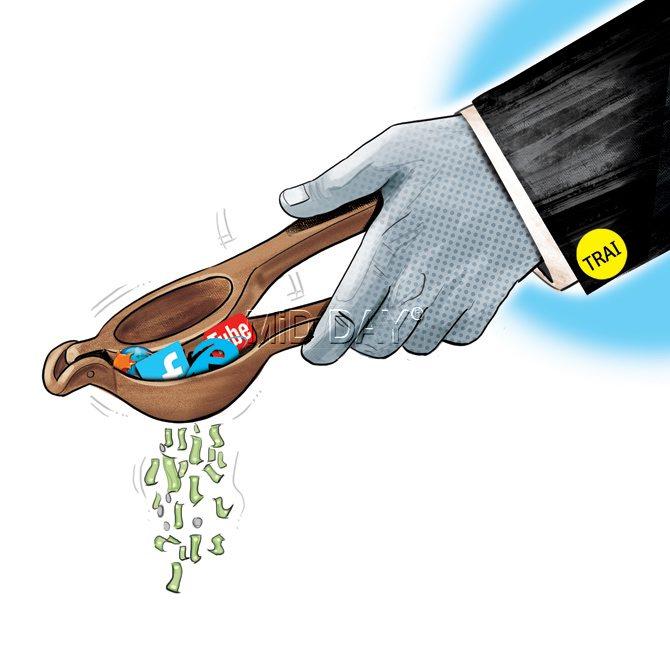It’s that time of the month. Time to do one or all of these things: Sign the petition on net neutrality for India...

net neutrality
 It’s that time of the month. Time to do one or all of these things: Sign the petition on net neutrality for India — www.change.org/p/rsprasad-trai-don-t-allow-differential-pricing-of-services-let-consumers-choose-how-they-want-to-use-Internet-netneutrality. Tweet to Communication and Information Technology Minister Ravi Shankar Prasad, and Prime Minister Narendra Modi. Write to the Telecom Regulatory Authority of India (TRAI) — advqos@trai.gov.in. Tell them to keep the Internet as free, fair and neutral as possible.
It’s that time of the month. Time to do one or all of these things: Sign the petition on net neutrality for India — www.change.org/p/rsprasad-trai-don-t-allow-differential-pricing-of-services-let-consumers-choose-how-they-want-to-use-Internet-netneutrality. Tweet to Communication and Information Technology Minister Ravi Shankar Prasad, and Prime Minister Narendra Modi. Write to the Telecom Regulatory Authority of India (TRAI) — advqos@trai.gov.in. Tell them to keep the Internet as free, fair and neutral as possible.
ADVERTISEMENT
Some of you may have glazed over every time the term ‘net neutrality’ slid past.

Illustration / Amit Bandre
So here’s the short version. Right now, if you can access the Internet, you can, potentially use it as you need: for starting a small business, working a political cause, finding old friends, new loves and cheap tickets. Quantity of data used determines what you pay — this is a neutral basis for Internet use, hence net neutrality.
This is not to be naïve about the Internet. Offline social inequalities do get replicated online. However, the Internet’s inherently neutral structure allows you to disrupt these equations too, and innovate networks, ultimately impacting those social equations.
Mysteriously, telecom operators don’t like this. Based on their lobbying, the Telecom Regulatory Authority of India (TRAI) has issued a consultation paper basically suggesting service providers can block certain websites and apps unless these pay them to provide access to users. So your Internet plan may now give you decent access to primarily one search engine, one video-sharing site, one social media site. These may be the worst possible options, but these are also the ones that paid your service provider to monopolise your custom. Even if they are good services, we all know what the absence of competition does to products. The user is the loser. You can read more at www.netneutrality.in.
Here’s the important bit. The paper is up for public feedback until April 24. So, until then, you can give the feedback that this discriminatory pricing of access to websites is anti-consumer, anti-people, anti market and anti sensible.
The Internet is no longer just one part of our communication. It is the medium of communication. It is the space of newness and innovation that revitalises us socially, economically, politically. In a time when large corporates have leached the market of its creativity and natural rhythms, it is the Internet that has allowed entrepreneurial energy to flower, different scales to co-exist, different models to succeed in different contexts, different creativities to find popularity.
It has offered us choices that the mainstream market and political world did not offer us — old Hindi film songs no radio station finds worthwhile are hugely popular on YouTube where people have uploaded them — adding value to YouTube as a business, while giving us something we want. Comedy, a dying art has been revitalised online. Quick ticket bookings, cute
handmade shoes, a resource like Wikepedia — the Internet has made these diverse models viable.
That is what the market is supposed to look like — a place richly responsive to the needs of consumers and citizens, not just the greed of corporations. A place where social, economic and cultural energies converge for the prosperity of a society at multiple levels. Big corporations sing a nice tune about the free market but listen closely to the lyrics — sounds like tax evasion, sops and rig it in my favour, hai na?
Coporates lobby hard with governments, so governments seem to listen to them more. So, we, who make the Internet what it is, must lobby for ourselves. Sign that petition, tell others to do it and keep the Internet meaningful and beautiful.
Paromita Vohra is an award-winning Mumbai-based filmmaker, writer and curator working with fiction and non-fiction. Reach her at www.parodevi.com.
The views expressed in this column are the individual’s and don’t represent those of the paper.
 Subscribe today by clicking the link and stay updated with the latest news!" Click here!
Subscribe today by clicking the link and stay updated with the latest news!" Click here!







